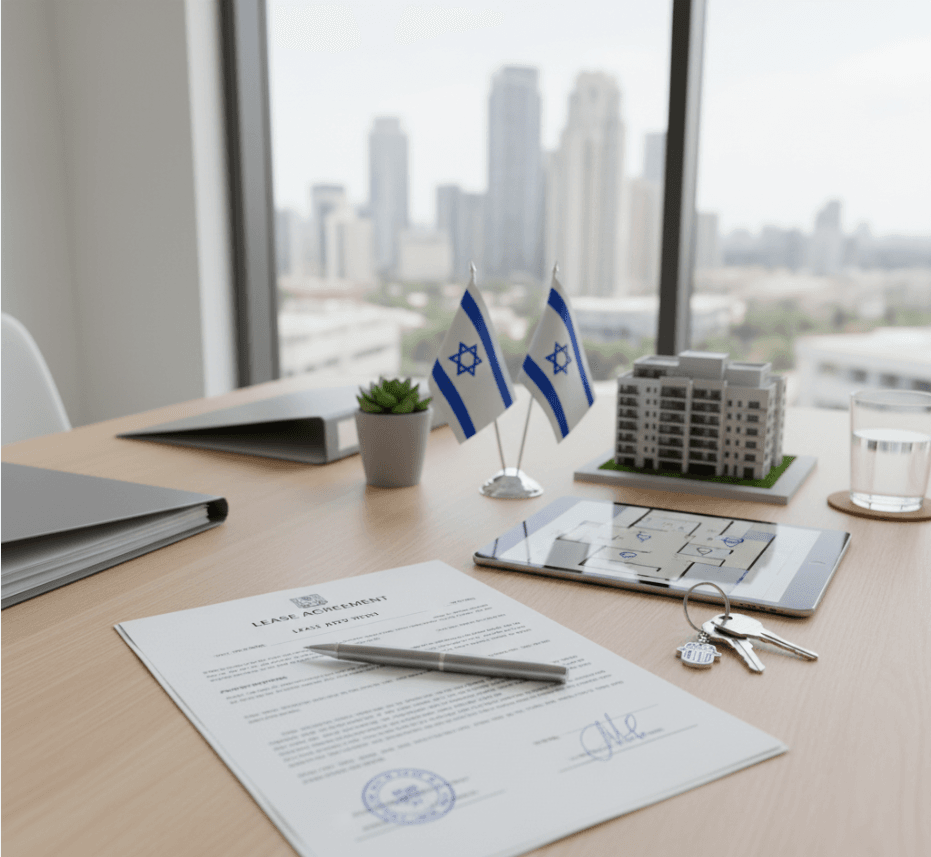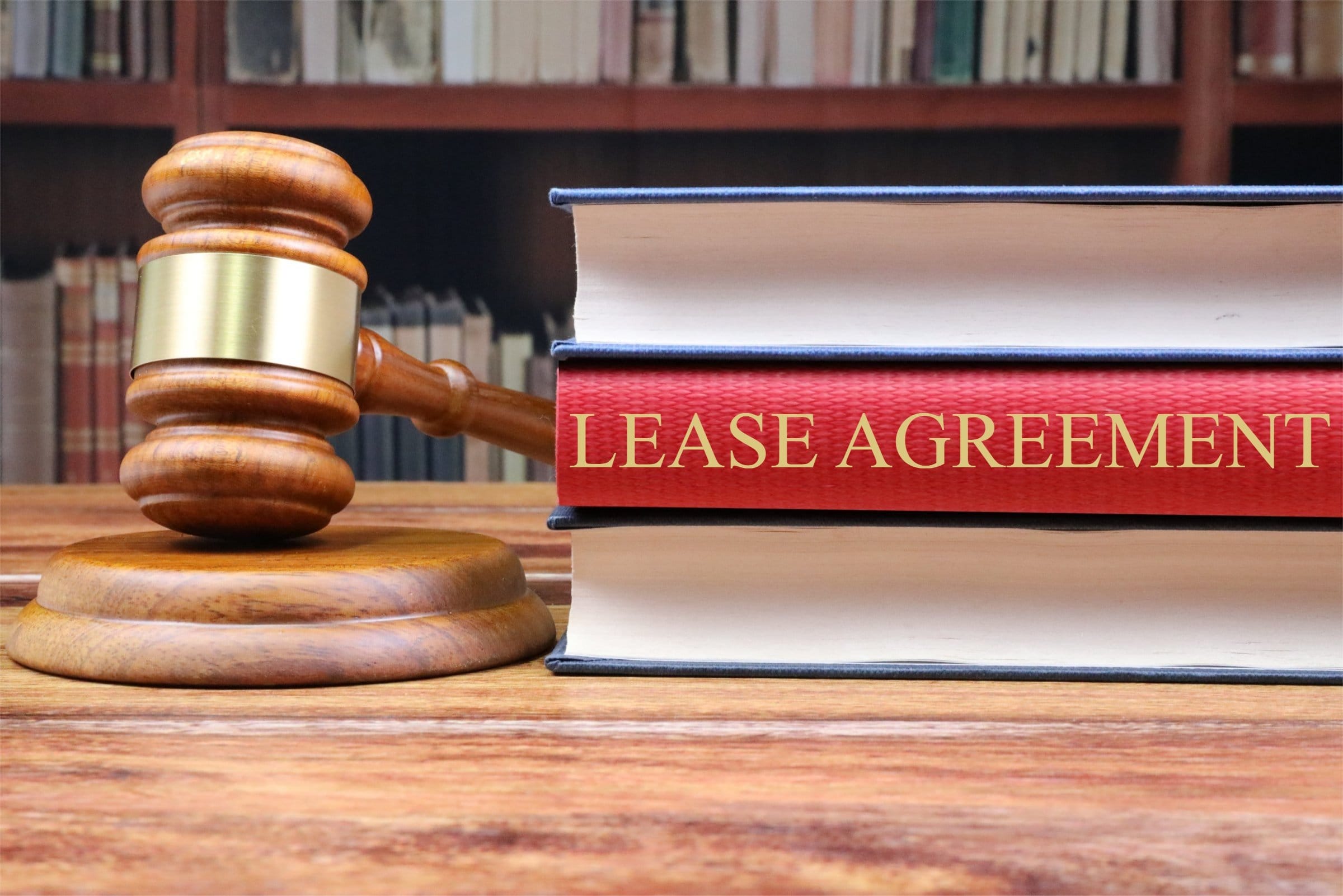
- 我如何根据 1973 年以色列合同法签订租赁协议?
- A Complete Guide to Lease Agreements in Israel
- What Must Be Included in a Lease Agreement in Israel?
- Mandatory Components of a Lease Agreement in Israel
- Types of Lease Agreements Under Israeli Real Estate Law
- Requirements for a Legally Compliant Lease Agreement
- Legal Obligations for Landlords and Tenants in Israel
- Tenant Rights Under Israeli Law: A Closer Look
- Types of Leases and Common Terms
- Common Pitfalls in Lease Agreements in Israel
- The Process of Drafting and Signing a Lease Agreement in Israel
- Final Thoughts: The Importance of a Well-Drafted Lease
- FAQs: Common Questions About Lease Agreements in Israel
- 1. Can a Lease Agreement Be Oral in Israel?
- 2. What Happens If a Lease Is Not in Writing?
- 3. Can a Landlord Evict a Tenant Without Notice?
- 4. Is a Security Deposit Required by Law?
- 5. Can Tenants Make Modifications to the Property?
- 6. How Are Rent Increases Handled in Israel?
- 7. What Are the Tenant’s Rights If the Property Becomes Uninhabitable?
- 8. What Types of Leases Are Common in Israel?
- Conclusion: Lease Agreements Are More Than Just Paperwork
- Contact Us: Your Trusted Israeli Lawyer and Law Firm for Real Estate in Israel
我如何根据 1973 年以色列合同法签订租赁协议?
以色列的租赁协议 合同法 – 1973, 是以色列的合同,它是一份法律文件,允许私人当事人以合法的方式制定自己的法律。
在合同中,他们对自己施加义务以换取利益、以色列财产的地主和公寓的承租人。这些义务可以是做某事或给予某事或不做某事的授权。通常,在谈论以色列公寓的租赁协议时,相反的好处可能是金钱,新以色列谢克尔。
A Complete Guide to Lease Agreements in Israel
了解以色列的租赁协议
Renting a property in Israel, whether it’s an apartment in Tel Aviv or a villa in Jerusalem, comes with a lot of considerations. Understanding the different types of lease agreements and the legal requirements involved is crucial for both tenants and landlords. Israeli property law provides some flexibility when drafting lease agreements, but it also has clear rules that need to be followed. In this guide, we’ll dive deep into what types of lease contracts can be made under Israeli real estate law and cover everything you should know before signing on the dotted line.
What Must Be Included in a Lease Agreement in Israel?
Importance of Content in Lease Agreements
When drafting a lease agreement, both landlords and tenants must pay careful attention to the content included and excluded from the contract. It’s not just about what’s written in the lease; it’s also about what might have been left out, intentionally or not. Both parties should ensure that every possible scenario is covered to avoid misunderstandings later. Remember that the omissions in a lease can be just as impactful as what’s explicitly included.
Creating Custom Obligations Under Israeli Real Estate Law
根据 以色列房地产法, there is a great deal of flexibility for landlords and tenants to create obligations that fit their specific circumstances, as long as they are within the legal framework. For example, if the lease pertains to a residential apartment, the agreement should clearly define the tenant’s rights to use the property and the landlord’s obligations for its upkeep. This freedom allows both parties to create a lease that serves their needs while adhering to the basic requirements set out by Israeli law.
Key Insight: Even though lease agreements can be customized, they are still subject to the rules of Israeli property law, which aims to protect tenants and landlords alike, especially considering the potential power imbalance.
Mandatory Components of a Lease Agreement in Israel
Essential Elements in a Lease Agreement
A 以色列的租赁协议 must include specific essential components to be legally binding and enforceable. While both parties are allowed to add clauses that suit their particular needs, there are several things that must be included:
1. Written Agreement Requirement
The first requirement is that a lease agreement must be made in writing and signed by both parties. This rule is designed to ensure clarity and prevent disputes. While a verbal lease can be valid, a written agreement provides concrete evidence of what both parties agreed to.
- Written Lease: Both the landlord and tenant must keep a signed copy. A written lease should include the lease duration, rent amount, tenant rights, and landlord responsibilities.
2. Property Description and Details
The lease must include a detailed description of the property being rented. This description should include the address, unit number, and any features such as appliances or other fixtures provided by the landlord.
- 租期: Clearly state how long the lease will last. In Israel, most leases are for one year, but they may be extended.
- Rent Payment Terms: Specify the rent amount, how it should be paid (e.g., bank transfer, post-dated checks), and when it is due each month.
- Additional Costs: Detail any additional costs the tenant is responsible for, such as 阿诺纳 (municipal property tax), utility bills, and maintenance fees.
提示: Make sure that the lease includes a detailed list of all items in the property, especially if it’s furnished, to avoid any disputes over what was provided.
Subletting and the Role of the Landlord
Consent for Subletting
In Israel, subletting is only allowed if the landlord gives prior written consent. If the tenant sublets without this consent, they could face legal issues, including potential eviction. The lease agreement should explicitly state whether subletting is allowed and any conditions that apply.
- Landlord’s Right to Object: If the landlord refuses consent for subletting without reasonable grounds, the tenant may still be able to sublet the property. However, the best practice is to get everything in writing to avoid disputes.
Tenancy Law and Legal Protections for Tenants
Tenant and Lending Act Law (1971)
Under the Tenant and Lending Act Law (1971), certain tenant protections are guaranteed. This law aims to balance the power between landlords and tenants by ensuring landlords do not exploit their position.
- Tenant Protections: The law requires landlords to maintain the property in habitable condition, and they cannot impose unreasonable obligations on tenants.
- Reasonable Clauses: Any clauses in the lease deemed unreasonable under the law may be unenforceable, providing additional protection to tenants.
Types of Lease Agreements Under Israeli Real Estate Law

1. Standard Residential Lease Agreement
A standard residential lease agreement is the most common type of rental contract in Israel. It typically lasts for one year, with an option to extend if both parties agree. This type of lease includes all the details that outline the landlord’s and tenant’s rights and responsibilities.
- One-Year Lease: Most residential leases in Israel are made for a year, with renewal options.
- Maintenance and Repairs: It details which party is responsible for maintaining the property, including minor repairs.
- Renewal Options: Some leases include a renewal clause, allowing the tenant to stay in the property beyond the original term if both parties agree.
Pro Tip: Always check if your lease has a renewal clause. It could save you time and trouble if you decide to extend your stay.
2. Long-Term Lease Agreement
A long-term lease agreement is signed for an extended period, such as five or more years. This type of lease is popular for commercial properties and is occasionally used for residential properties where tenants seek more stability.
- Benefits of Long-Term Leases: These leases provide stability for tenants, particularly those who plan to stay in the property for many years.
- Rent Increases: Often, long-term leases include clauses that tie rent increases to inflation or the Consumer Price Index (CPI).
提示: Make sure you understand how rent increases are structured in a long-term lease. These increases can significantly impact your budget.
3. Sublease Agreement
A sublease agreement allows a tenant to lease out part or all of the property to another individual. Subleasing is only permitted if the landlord consents in writing.
- Primary Tenant’s Responsibility: The original tenant remains responsible for rent payments and any damages, even if they are caused by the sub-tenant.
- Landlord’s Consent: Always get the landlord’s approval before subletting, and include clear terms for the sub-tenant to avoid conflicts.
4. Protected Tenancy Agreement
A protected tenancy agreement is governed by the 租户保护法(1972年). This type of lease restricts the landlord’s ability to evict the tenant and limits rent increases.
- Eviction Protection: Under this agreement, landlords cannot evict tenants without valid legal grounds.
- Rent Control: Rent is often kept at below-market rates, which is beneficial for the tenant but not very common today.
警告: Protected tenancies are rare, and if you’re entering into one, it’s essential to understand the limitations and benefits fully.
Requirements for a Legally Compliant Lease Agreement

Does the Lease Agreement Need to Be Written?
Yes, in Israel, a residential lease agreement must be in writing, especially for long-term leases. Both the landlord and tenant must sign the document, and each should retain a copy. A lease without a written contract is still valid but lacks the protection and clarity that a written agreement provides.
- Non-Compliance Issues: If a lease is not in writing, it does not become invalid, but it may open the landlord to additional restrictions, especially concerning tenant rights.
Description of Property and Included Items
The lease must provide a clear description of the property and any items included in the rental, such as:
- Furniture: List all pieces of furniture included in the rental.
- Appliances: Include details about appliances provided by the landlord.
- Condition: Note the property’s condition to avoid disputes over damages at the end of the lease.
提示: Prepare an inventory list of all items in the property and attach it to the lease agreement.
Legal Obligations for Landlords and Tenants in Israel
Landlord’s Responsibilities Under Israeli Law
Handing Over the Property: The landlord must hand over the property on the agreed date, free from any occupants or items that haven’t been agreed upon.
Maintenance Obligations: The landlord must repair any significant defects that are not caused by the tenant’s misuse. For urgent repairs, the landlord is obligated to act within three days of notification.
Key Point: Even if the lease doesn’t mention the landlord’s maintenance responsibilities, Israeli law requires the landlord to make necessary repairs.
Tenant’s Responsibilities Under Israeli Law
Paying Rent on Time: The tenant must pay the rent according to the terms agreed upon in the lease.
Property Maintenance: Tenants are expected to use the property responsibly and ensure it remains in good condition throughout their tenancy.
Subletting Rules: Tenants must follow the rules regarding subletting and get written consent from the landlord before allowing someone else to occupy the property.
Important: Any misuse of the property that leads to damage will be the tenant’s responsibility.
Tenant Rights Under Israeli Law: A Closer Look
租户保护法(1972年)
这 租户保护法(1972年) provides significant protections for tenants, ensuring landlords maintain basic habitability standards and treat tenants fairly. Here are some of the key protections:
- Habitability: Landlords are required to keep the property in habitable condition, which means having functional plumbing, electricity, and proper ventilation.
- Reasonable Use: The tenant should be able to enjoy the property without interference from the landlord.
Key Tip: Understanding your rights under Israeli law can help you avoid problems during your lease. Engaging with a knowledgeable lawyer can provide additional peace of mind.
Types of Leases and Common Terms
Open-End Lease vs. Fixed-Term Lease
Fixed-Term Lease: This is the standard type of lease in Israel. It is usually for one year and includes the option for renewal. The lease automatically ends after the term unless renewed.
Open-End Lease: This type of lease does not have a fixed end date, which provides more flexibility. Either party can terminate it with proper notice, but this type of lease is less common and may not provide the security a tenant or landlord needs.
Rent Control and Protected Leases
Protected Lease: These leases are governed by the Tenant Protection Law, ensuring that tenants can’t be evicted without proper cause and that rent remains affordable.
- Rent Restrictions: Protected leases often have strict rent controls that limit the amount landlords can charge.
- Eviction Limits: Tenants with a protected lease are very difficult to evict, providing significant stability.
Note: Protected leases are much less common now, and if you’re considering entering one, make sure to consult a lawyer to understand its benefits and limitations.
Common Pitfalls in Lease Agreements in Israel
Not Having a Written Lease
A verbal lease can be legally valid, but it is always better to have a written lease. Written leases provide clear documentation of what has been agreed upon and make it easier to resolve disputes if they arise.
提示: Never enter into a lease without a signed written contract, even if you trust the other party.
Misunderstanding Maintenance Responsibilities
One of the most common issues between landlords and tenants is the responsibility for maintenance. The lease should clearly state who is responsible for what. For example, landlords are typically responsible for significant repairs, while tenants handle minor issues.
Avoid This Pitfall: Be sure to include a maintenance clause in the lease. If something breaks, both parties should know who is responsible for fixing it.
Not Including a Rent Increase Clause
If the lease is for longer than a year, it may include a clause allowing the landlord to increase the rent. The clause should specify how much and when the rent can increase.
- CPI Indexation: Rent increases are often tied to the Consumer Price Index (CPI), which is a measure of inflation.
提示: Make sure you understand the rent increase terms before signing a long-term lease.
Ignoring the Renewal Clause
If your lease has a renewal clause, make sure you understand the conditions for renewing the lease. Some leases automatically renew if neither party provides notice, while others require the tenant to notify the landlord if they wish to extend.
Important: Always check for any notice period requirements. If you fail to notify the landlord in time, you could lose the opportunity to renew.
Inadequate Property Description
一个 incomplete property description can lead to misunderstandings. The lease should detail all the fixtures, furniture, and amenities that come with the property.
Inventory List: Include an inventory list as part of the lease, signed by both parties. This list should detail every item in the property, which will help prevent disputes over missing or damaged items when the lease ends.
The Process of Drafting and Signing a Lease Agreement in Israel
Drafting the Lease Agreement
Drafting a lease agreement is a crucial step in renting out a property. The agreement must be clear, comprehensive, and compliant with Israeli law. Both the landlord and tenant should review the draft thoroughly to ensure their interests are represented.
- Professional Help: If you’re unfamiliar with 以色列房地产法, it’s a good idea to work with a lawyer to draft or review the lease.
- Terms and Conditions: The lease should include all the necessary terms, such as rent payment, lease duration, maintenance responsibilities, and special conditions like pet policies.
提示: Use an experienced Israeli real estate lawyer to ensure your lease complies with local laws.
Signing the Lease Agreement
After drafting the lease agreement, both parties must sign it for it to be legally binding. Each party should keep a signed copy for their records.
- Security Deposit: Typically, a security deposit is required when signing the lease. This deposit is intended to cover any damages to the property or unpaid rent.
- Proof of Identity: Both the landlord and tenant should provide proof of identity, and in some cases, a guarantor may be required to ensure the lease obligations are met.
Registration of the Lease
In Israel, residential leases are generally not registered with the land authority unless they are long-term leases. However, registering a lease can offer additional legal protections, especially for commercial leases or longer-term agreements.
When to Register: Long-term leases (typically over five years) may benefit from being registered with the Israel Land Authority, especially if significant investments are involved.
Final Thoughts: The Importance of a Well-Drafted Lease
Protecting Both Parties
A well-drafted lease agreement is essential for protecting the rights and obligations of both the landlord and the tenant. It serves as the framework that defines how both parties should behave during the lease term, what is expected from each, and how disputes will be resolved.
Balanced Lease Agreements: A balanced lease agreement ensures that both parties have clearly defined rights and responsibilities, reducing the likelihood of disputes. It also ensures compliance with Israeli real estate law, which is crucial for avoiding legal complications.
Landlord and Tenant Relationship
A successful landlord-tenant relationship depends on clear communication 和 mutual respect. A well-drafted lease sets the tone for this relationship by establishing fair terms and defining boundaries.
提示: Make sure to communicate openly during lease negotiations. Address any questions or concerns before signing the lease, as this helps establish trust and prevents misunderstandings later.
Common Issues After Signing the Lease
After signing the lease, both parties may encounter various issues, ranging from maintenance requests to disputes over property use. It’s important for both the landlord and tenant to refer to the lease to resolve these issues.
- Dispute Resolution: The lease should include a dispute resolution mechanism, such as mediation or arbitration, to handle conflicts without resorting to costly litigation.
- Regular Property Inspections: Landlords may include a clause that allows them to inspect the property periodically, provided they give reasonable notice to the tenant. This can help identify any issues early on and keep the property in good condition.
FAQs: Common Questions About Lease Agreements in Israel
1. Can a Lease Agreement Be Oral in Israel?
Yes, a lease agreement can be oral and still be legally valid under Israeli law. However, a written lease is always preferable, as it provides a clear record of the agreed terms, reducing the likelihood of disputes.
2. What Happens If a Lease Is Not in Writing?
If a lease is not in writing, it can still be enforceable, but it lacks clarity. A written lease helps ensure that all parties understand their rights and responsibilities. Without it, proving the terms of the lease in court can be challenging.
3. Can a Landlord Evict a Tenant Without Notice?
No, a landlord cannot evict a tenant without providing proper notice. The amount of notice required will depend on the terms of the lease and Israeli rental laws, but in general, landlords are required to give advance notice before terminating the lease.
4. Is a Security Deposit Required by Law?
While a security deposit is not required by law, it is common practice in Israel. The deposit is used to cover any damage or unpaid rent at the end of the lease. The terms for the deposit, including how much is required and when it will be returned, should be included in the lease agreement.
5. Can Tenants Make Modifications to the Property?
Any modifications to the property, such as painting walls or installing shelves, should be discussed with the landlord and included in the lease agreement. Without written permission, the landlord may require the tenant to restore the property to its original condition at the end of the lease.
6. How Are Rent Increases Handled in Israel?
Rent increases should be outlined in the lease. Often, leases include a clause for annual rent increases tied to the Consumer Price Index (CPI) or other inflation measures. The tenant should understand how these increases will be calculated and when they will occur.
7. What Are the Tenant’s Rights If the Property Becomes Uninhabitable?
Under the 租户保护法, landlords must provide the property in a habitable condition. If the property becomes uninhabitable due to structural issues or other factors, the tenant may have the right to terminate the lease or request that the landlord make necessary repairs.
8. What Types of Leases Are Common in Israel?
The most common leases are standard residential leases, long-term leases, subleases, and protected leases. Each has different rights and responsibilities, so it’s important to understand the type of lease you are entering into.
提示: Always consult with a lawyer if you are unsure about the lease type or any of its clauses.
Conclusion: Lease Agreements Are More Than Just Paperwork
Lease agreements in Israel are fundamental to ensuring a smooth relationship between landlords and tenants. From standard residential leases to long-term commercial agreements, understanding the intricacies of each type and knowing what should be included is crucial. Both landlords and tenants have legal obligations, and knowing these can help you navigate the rental process confidently.
Final Advice: Whether you’re a tenant or a landlord, investing time in drafting and reviewing the lease agreement is essential. It provides a legal foundation for your relationship and helps prevent disputes down the line. A well-drafted lease agreement is more than just paperwork—it’s your key to a successful rental experience in Israel.
Remember, when in doubt, consult a legal professional. 以色列房地产法 has unique nuances, and having expert guidance ensures that your interests are always protected.
Contact Us: Your Trusted Israeli Lawyer and Law Firm for Real Estate in Israel
Whether you are renting, buying, or leasing property in Israel, having a trusted Israeli lawyer by your side makes all the difference. At Menora Law, our team of experienced Israeli lawyers offers comprehensive real estate legal services designed to cater to both local and international clients. As a leading Israeli law firm, we specialize in guiding clients through the intricacies of Israeli property law, ensuring that your investment is secure and legally sound.
Why Work with Menora Law, Your Israeli Law Firm?
- Expert Israeli Lawyers: Our law firm is comprised of experienced Israeli lawyers who are well-versed in real estate law, helping both local and foreign clients navigate property transactions with confidence.
- Bilingual Legal Assistance: As an Israeli law firm with a presence in Los Angeles and Israel, we provide services in both English and Hebrew, bridging the gap for international clients who need an Israeli lawyer to handle their real estate dealings.
- Client-Focused Approach: We understand the unique needs of clients investing in Israeli property from abroad and tailor our legal services to meet those needs effectively.
Book Your Free Consultation with an Israeli Lawyer Today
If you are considering renting or leasing property in Israel, we invite you to connect with one of our expert Israeli lawyers for a free initial consultation. During this consultation, we can discuss your needs, answer any questions, and provide you with the information you need to proceed confidently.


